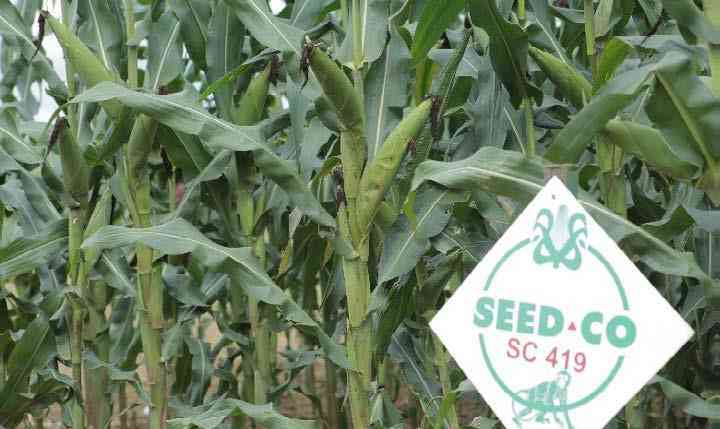
In the mid-term economic review, the agricultural sector’s growth projection was revised upwards to 21,5%, marking a strong recovery from 18,1% contraction in 2024.
This contraction was caused by the El Niño-induced drought. While much attention has been given to the record tobacco output of 352,7 million kg in 2025, worth about US$1,2 billion, less has been said about maize and wheat.
Maize production had plunged to an estimated 635 000 tonnes in 2024, more than 60% below the five year average.
Government forecasts for the 2024/2025 season point to a rebound of 2,3 million tonnes, well above the national consumption requirement of 1,8 million tonnes.
Wheat, Zimbabwe’s second most important cereal, also performed strongly. In 2024, the country produced a record 375 000 tonnes, surpassing annual demand of 360 000 tonnes. The Ministry of Agriculture targets at least 600 000 tonnes for 2025.
Seed Co Limited is at the centre of this, it drives the breeding, multiplication, and distribution of high performing hybrid seeds. This not only relates to maize, but also wheat, sorghum, groundnuts, rice, and beans. Seed Co operates across 15 African countries, making it a cornerstone of regional food security.
This year, Seed Co Limited celebrates 85 years of existence, a legacy that explains why maize remains its flagship brand. The company traces its origins to 1940 as the Seed Maize Association, long before rebranding as Seed CO in 1983 after merging with the Crop Seeds Association. Seed CO listed on the Zimbabwe Stock Exchange (ZSE) in 1996.
Today, Seed Co has two associates and one subsidiary. Seed Co International is one of the associates. Many people often confuse Seed CO International with Seed CO Limited, but the difference lies in ownership structure and operations.
- Teachers, other civil servants face off
- Veld fire management strategies for 2022
- Magistrate in court for abuse of power
- Vungu Dam water treatment and irrigation project takes off
Keep Reading
In 2018, Seed CO International was separated from its parent, Seed CO Limited, following shareholder approval to spin off 71% of its shareholding, resulting in the independent listing of its regional operations. Seed CO International was then listed on the Botswana Stock Exchange (BSE), with a secondary listing on the ZSE that same year.
In 2020, its ZSE listing was terminated, and the company became the first to list on Victoria Falls Stock Exchange (VFEX). Seed CO Limited currently retains a 27% ownership stake in Seed CO International.
Another associate of Seed CO is Quton Seed Zimbabwe, in which the company holds a 40% stake. Quton specialises in the breeding and distribution of cotton seeds. Seed CO also has a subsidiary, Prime Seed Zimbabwe, a 51% joint venture focused on vegetable seeds.
Seed CO posted a 93% revenue surge to US$71,2 million for the year ending March 31, 2025, up from US$36,9 million in 2024. This was driven by a 52% increase in seed volumes, rising from 19 726 metric tonnes in 2024 to 30 037 metric tonnes in 2025, reaching 1,6 million farmers compared to 1,2 million in 2023 and 2024. Buffer stocks carried over from 2024 allowed the company to meet higher demand locally and regionally without significantly increasing production.
Maize volumes surged 91%, largely due to export demand, soybeans rose 59%, and wheat sales in Zimbabwe increased 8% to 6 502 metric tonnes.
Despite higher revenue, profitability declined. EBITDA fell to US$23 million from US$51 million, while operating income dropped 58% to US$20,7 million. Profit after tax fell to US$17,5 million from US$21,2 million.
The paradox of rising revenue but falling profits stemmed from the absence of elevated foreign exchange gains that had previously boosted earnings under ZWL reporting, with a US$50,6 million decline in exchange gains weighing heavily on net profit.
Receivables rose to US$45,7 million from US$28,4 million, reflecting delayed collections amid Zimbabwe’s liquidity challenges, with the government, Seed CO’s largest debtor, representing a significant portion.
It is worth noting that management’s decision to apply an alternative exchange rate for non-monetary assets, intended to reflect market realities, deviated from IFRS standards, resulting in an adverse audit opinion.
Operationally, Seed CO continues to diversify into rice, potatoes, hybrid sorghum, and vegetable seeds to meet evolving farmer and consumer preferences.
The company has committed to releasing at least five new maize hybrids and one upgraded variety from other crop categories each year, underscoring its focus on innovation.
Looking into FY26, from an analytical perspective, the shift to adopting the US dollar as the functional reporting currency was a prudent step toward ensuring more meaningful results.
However, given that the government remains its largest debtor and the RBZ has floated a de-dollarisation plan, the group will need to establish clear lines of communication with authorities to avoid potential disruptions, should such a policy shift eventually materialises.
It is also noteworthy that Seed CO employees hold a stake in Seed CO, as does Delta Corporation through its pension fund, with both ranking among the top 20 shareholders, a strategic connection for Delta, given that sorghum and maize are key raw materials for its operations.
Taimo is an investment analyst with a talent for writing about equities and addressing topical issues in local capital markets. He holds a first class degree in Finance and Banking from the University of Zimbabwe. He is an active member of the Investment Professionals of Zimbabwe community, pursuing the Chartered Financial Analyst charter designation.






